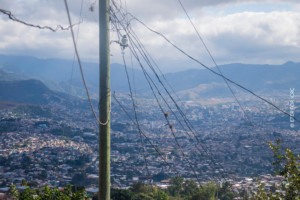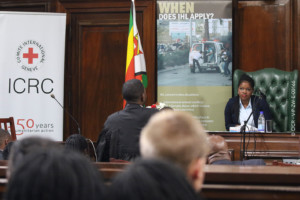Africa will certainly be at the heart of the discussions in Istanbul not only because it is the region that has been the most affected by an accumulation of severe humanitarian crises, but also because local and national organizations operating across the continent have developed expertise, aroused concern, and proposed solutions. These must be addressed during the Summit. The experience of these organizations can bring substance to the reform of humanitarian aid being drafted.
Africa is the continent that, without question, is focused by financial analysts who see emerging economies taking shape with high growth rates hovering near 6%. Such growth figures are also put forward by politicians to highlight the positive results of the development programs that have been undertaken. However, the impact of this growth on the daily lives of the bulk of Africans and on the qualitative changes to the living conditions that govern their existence needs to be pointed out.
Growth without prosperity?
Enjoying little of the prosperity of economic growth, these populations must nonetheless face the humanitarian challenges fashioned by natural disasters and health crises, the rampant growth of crime-ridden big cities, precarious living conditions, environmental decay due to climate change, terrorist activities, and flows of displaced persons. These hardships lay bare the tragedy of their everyday human existence, and dash their hope of ever being able to escape from the kind of poverty that leaves refugees, the homeless, the weak, the sick, and the socially neglected on the side of the road.
In North Africa, terrorist groups are progressively extending their tentacles, sparing no region. In the center of the continent, the disastrous effects caused by the Ebola hemorrhagic virus led to thousands of deaths and to the breakdown of social values and the near-collapse of fragile medical facilities[1]Refer to the inaugural issue of the review Alternatives Humanitaires which published a focus on Ebola: http://alternatives-humanitaires.org/fr/category/focus-fr/ebola-la-fin-du-cauchemar/ At last … Continue reading. In the South and the East, the drought cycle is never-ending. It is therefore natural to expect that concerns be aroused concerning the further deterioration of the living conditions of African populations continuing to be largely forgotten by their governments and by humanitarian organizations.
Recognizing and valuing the role of African humanitarians
This state of affairs has prompted African leaders to reflect on these matters and to present them at the World Humanitarian Summit to be held in Istanbul. These leaders will have to advocate a new vision of humanitarian action, greater solidarity, and a reduced operational stranglehold by UN agencies and international NGOs, and promote greater responsibility and stronger involvement in African NGOs. But political leaders, like those from the African civil society, are not freed of responsibilities when it comes to the running of humanitarian operations. Their people increasingly demand, sometimes with violence, that their human rights be upheld, and that they be better governed and sustained.
The UN Secretary-General, in his message announcing the launch of preparations in 2013 for the World Humanitarian Summit, indicated that the Summit was to be a turning point for humanity[2]He stated, “We need to share best practices and find innovative ways to make more humanitarian action effective and inclusive. future needs can only be fulfilled through effective and innovative … Continue reading. It was going to represent, in fact, the perfect opportunity for Africa to position itself, through what it had experienced, no longer as “a partner in tow”, but as key player at the heart of any strategy or intervention. In favor of this, it can be argued that Africa itself is fully cognizant of the makeup its people, of the true needs at stake, of the necessary responses and proper management of humanitarian crises.
Therefore, we see surfacing new sociological patterns of relief that reflect the presence of religious activity, which negatively impacts people’s attitudes toward humanitarian operations. Cases in point are the refusal to be vaccinated, and the incentives of not complying with recommendations to safely bury the victims of the Ebola virus. To this already alarming situation, we can add the consequences of terrorist activities of jihadists that have triggered a large number of deaths and injuries in the civilian population.
But the protection of humanitarian aid workers, exposed to attacks of all kinds, should also be a point of major concern. This became especially obvious during the Ebola crisis in Guinea when a lack of knowledge of social processes spark-ed negative reactions and resulted in a tragic end for humanitarian aid workers. “During aid operations concerning Ebola virus victims, Red Cross volunteers were frequently exposed to popular vindication, aggressed and their vehicles damaged under the pretext that they were at the origin of this sickness, the cause of their personal drama and that they were gravediggers[3]Testimony collected during a discussion with Guinean Red Cross Volunteers during the partnership meeting of this national society in February 2016.”. This confirms the extent to which it is necessary to be mindful of the sociological heritage of populations and to integrate this facet as part of intervention strategies.
While many African humanitarian operators in fact do play an essential role, the remarkable work being accomplished by the Red Cross and Red Crescent Societies must be highlighted, since it is the one with which we are the most familiar. Thousands of volunteers from this organization deliver unequivocal humanitarian emergency relief and aid throughout the countries and they supplement the public assistance provided by governments. They are a key resource and represent a true added value in interventions. Whatever may be their field in which they operate and the challenges they face, these volunteers are always on the scene and are fully committed. They deserve that, during the Summit, their voices be heard by Africans who are the recipients of most humanitarian interventions. The role of volunteers, their requirements for safety, and the relationship they have between the agencies they represent and national agencies and other stakeholders must appear on the agenda for discussions with African representatives in Istanbul. This was the case at the last international conference of the Red Cross and Red Crescent Societies that was held in Geneva in December 2015.
Finances and resilience
Access to financing is obviously a crucial aspect of humanitarian action that presents special challenges for African NGOs. Few receive funding from their governments, and, in fact, in most countries financial mechanisms enabling them to submit projects to receive aid are totally absent. For them to survive, they have no other option than to let themselves be towed behind foreign international organizations.
According to the last 2015 report concerning international humanitarian aid, national and local NGOs received only 0.2% of that financing in 2014 against 0.4% in 2012, although they are first in line to respond to the humanitarian needs of the afflicted communities[4]Global Humanitarian Assistance, International humanitarian aid. Brief of the … Continue reading.
A report also published in 2015, as part of the initiative, Future Humanitarian Financing, sparked the idea of driving negotiations that would establish the best channels for collaboration among donors, UN agencies, and other stakeholders in the humanitarian sector[5]Cafod, FAO et World Vision, Looking Beyond the Crisis, 2015, http://www.urd.org/IMG/pdf/FHFpdf-2.pdf. It presented recommendations on the need for greater dialogue with local and national stakeholders and for cutting red tape and reducing the inefficiency that adds to the costs of interventions. Coordination of the assorted humanitarian operators is, in fact, a matter that must be addressed with varying approaches and management styles and must be structured and harmonized to achieve efficiency.
But aid provided to communities impacted by disasters should, we believe, give precedence to the power of resilience, a basic requirement that closes the loop on financial assistance. Indeed, by helping people to develop their own power of resilience and their own power to recover from any disaster, this approach helps them more strongly realize that they do not necessarily need to resort to humanitarian aid, let alone enjoy receiving it, but rather that the aid provided to them should have them learn that they can get by without it.
But this approach is constrained by its own funding mechanisms, which are distinct from those of emergency humanitarian aid financing. From our point of view, emergencies must be accompanied and supported by programs that not only respond to hardship, but that also promote resilience, so as to help them gradually thwart the impact of their vulnerable conditions and get communities to shape their own development.
This conviction was part of the conclusions of a report presented in December 2015 to the Inter-Agency Standing Committee (IASC), the Food and Agriculture Organization (FAO), and the World Bank[6]International Organisation for Migrations, Making the Links Work: How the humanitarian and development community can help ensure no one is left behind, 9 december 2014, … Continue reading. The report states that even though humanitarian aid does save many lives, it keeps people in a state of dependency. Setting up a synergistic strategy midway between “emergency relief” and “humanitarian resilience” seems more than ever the way to go.
Guideposts leading to a new humanitarianism
In the wake of humanitarian crises – health emergencies, natural disasters, terrorist threats, armed conflicts, flows of migration, climate changes – that are intensifying as much as they are becoming more diverse, given the complexity of coordinating interventions, the presence of armed personnel[7]This deserves mention in terms of neutrality and impartiality that must support all humanitarian assistance: NGOs should conduct their operations without interference or external pressure., and amid fears of a shortfall of funding, the African representatives in Istanbul will need to initiate objective, serious, and meaningful discussions. To carry weight when formulating guidelines and proposing funding mechanisms, and to be able to claim their own responsibility in coordination and their commitment to the well-being of their populations, they will need to speak out about their own expectations and those of their people.
Published in December 2015, the report written by the independent group of UN experts on humanitarian action, entitled, Too Important to Fail[8]High-Level Panel on Humanitarian Financing Report to the Secretary-General, Too important to fail. Addressing the humanitarian financing gap, December 2015, … Continue reading, described all the contours of humanitarian action. It highlights the difficulties in financing, the rivalries among stakeholders, and the relationship between humanitarianism and development. The analyses and the proposals referred to are not meant to be a panacea, but have the merit of acting as guideposts to advance and to view humanitarian assistance in another light. This study does not recreate the wheel, but the relevance of its arguments on topics covering all aspects of humanitarian action activates the levers that can spur innovation. The upcoming World Humanitarian Summit must unquestionably give them that empowerment, and that will not happen with-out the active participation of African humanitarian organizations.
Translated from the French by Alain Johnson.





